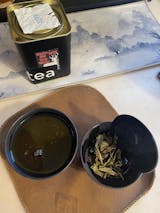Today was the second time I tried this tea and it's like a little bit of the universe seeped in my cup. It was sweet and smokey and definitely delicious. I would recommend trying this tea it's a tasty treat.
Strong grapefruit scent from the leaves and on the tea pot lit. Almost like grapefruit marmalade. More floral taste than other pomelo dancongs I've had but still has that citrus flavor when brewed properly. It seems to get bitter fast so shorter steeping times recommended (and I probably use less leaves than most). Still get two pots worth before it slows down which makes it a great value for me!
The tea took forever to arrive. But it was worth the wait. Delicious
A delicious autumn sheng, some light semi-aged flavors from aged material in the blend add a layer of complexity. It has a high pitched fragrance, a peachy, fruity character, and some mild bitterness to bring balance. Perfectly hits the spot for me in chilly weather.
I'm mid-way through sampling all of the teas. Each one is extraordinarily different from the next, and each tea is of such high quality that I've found myself looking forward to this sampling experience each day!
I had to do a bit of research on how to brew these teas, and I found the following method works well for me: use gong fu brew method, heat water to 180-185 F, rinse steeping of 15 sec (discard), flash steep for 5-6 sec and drink; repeat until flavor is too light and gradually increase steep time.










